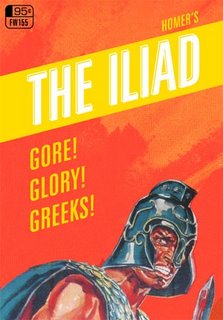
JKW here, reporting live from the Upper West Side of Manhattan. As promised, more Middle Welsh goodness.
No, this post won’t be about Dr Dolittle, nor, alas, will it concern itself with
Elsie the love cow, who, even if she doesn't "speak"
per se, does make a realistic mooing sound. Instead, today I want to post a few thoughts about animal speech in
Culhwch and Olwen.
Culhwch is the oldest Arthurian tale, old indeed: Sir Idris Foster dated the text to the last decades of the eleventh century, 1100 at the latest, in 1935, and the editors of the University of Wales Press edition some fifty years later largely agreed, although last year Simon Rodway proposed the middle of the twelfth century as
Culhwch's date. Whichever the case, it's the oldest of the
Mabinogion tales, and its material is certainly far older still.
What follows are a few sections from a paper I delivered last year at the Harvard Celtic Colloquium about
Culhwch and its talking animals.
---------------
So, what are these talking animals I mentioned earlier? Well, when Arthur's men are seeking to locate and free Mabon the son of Modron they soon find that they must rely on Gwrhyr the interpreter, whose abilities extend to speaking the language of animals, to petition information about Mabon from a series of geriatric animals, each older than the previous: a blackbird, a stag, an owl, an eagle, and a salmon.
The animals are eventually able to lead Arthur's retinue to the one of their number (the old salmon) that knows where Mabon is hidden away. A salient point about these informative animals is that they are not supernatural or particularly magical by nature but are in fact simply old, well connected, and open to inquiries. The Blackbird, the
Mwyalch Gilgwri, establishes a language of deferral that successive animals use to re-direct their human petitioners to yet older animals when he tells Gwrhyr, “
Kenedlaeth vileit yssyd gynt rithwys Duw no mi.” (“There is a type of creature God made before [he made] me.") Similar language is used by the Stag, the Owl, and the Eagle. This language of redirection is language of appeal to the authority of age, and it marks the animals in
Culhwch and Olwen as authorities to which the comparably far younger humans must turn for information. But it is the language that the animals speak and the historical realm that they call to mind that concern me most. Reading
Culhwch and Olwen’s animal speech, particularly that of the Owl, I suggest that the ancient world that the animals evoke suggests a submerged, chthonic, aboriginal realm unknown to the humans of Arthur's world but recalled by the Oldest Animals.
The Blackbird recalls an anvil that it has ground down to nothing over the years by pecking at it with its beak. The Stag tells of an oak tree that he knew in his youth, which same tree he watched go from sapling to tall tree to red stump. The Owl—and I shall return to this—situates the valley in which he lives in both geological and anthropological history by telling of the valley's past as a succession of forests sometimes inhabited by older races of men. Finally, the Eagle remembers a giant stone on which he used to perch that by Arthur's time has been eroded to a hand's breadth in size.
By virtue of their age the Oldest Animals are able to represent themselves as authorities that greatly predate Arthur's kingdom: they are individually older than the humans who live in Britain, and their memories are longer than those of the people with whom they share the island. By virtue of their animality these creatures mark for themselves a place of privilege in the landscape of Britain: they are not quite coextensive with the land, but as un-domesticated “wild” animals they are viscerally
of the land in a way that humans are not. By suggesting a tangible native history of which Arthur's retinue is unaware the animals identify the Arthurian polity as one that is a successor to other, prior ones. The narrative of the Owl in particular conjures a sense of cyclical time, of recurring epochs, and hints that Arthurian Britain may be only the latest in a series of distinct Britains. The Owl says that when he was first in his valley it was a wooded glen: “
y cwm mawr a welwch glynn coet oed,” he says, continuing that “
y deuth kenedlaeth o dynyon idaw, ac y diuawyt, ac y tyuwys yr eil coet yndaw,” which is to say that there came a race of men [to that glen], and that it was laid waste, and then there was a second growth of trees. “
A’r trydyd coet yw hwnn,” the Owl adds: this is the third such wood. The current occupants of the island of Britain are ignorant of their predecessors, and the prior ages recounted by the Owl are not marked as Arthurian prehistories (ages awaiting fulfillment in the coming of Arthur), but instead as other, different ages. Arthur’s polity, by implication, might one day join them in the animals’ memory.
What relevance might this supposed submerged polity, as embodied in the ageing animals, have? As the Owl indicates, he has lived through the coming of three forests and has witnessed the invasion of at least one race of men and the plunder and deforestation that accompanied such an invasion. The temptation to read the Owl's account as a native commentary on centuries of successive invasions is, to me at least, nearly overpowering. The Owl marks Arthur and his people not as originary Britons or as the embodiments of a romanticized origin myth. Instead, the members of Arthur's retinue are a people divorced from the native traditions and language of the land that they inhabit and who are dependent upon truly native intermediaries to negotiate that land's secrets, one of which is the whereabouts of Mabon.
Mabon, like the Oldest Animals, is a figure deeply anchored in the physical landscape of the island of Britain. Ysbadadden takes it for granted that Culhwch will be unable to locate Mabon, and without Gwrhyr and the Animals Ysbadadden might well have been right. Mabon, although a human figure, is unknown to the Arthurian polity; Mabon and the Oldest Animals make it clear that Arthur may inhabit the land but that he is not of it.
When the Oldest Animals question the originality of the Arthurian polity in Britain they essentially question the mythological foundation of what we might call early medieval Welsh national definition. As R. R. Davies notes in
The First English Empire, the Welsh-speaking peoples imagined themselves as the successors to an ancient British polity. Such an imagining “was…a profound historical, political, and prophetic statement. Historically it proclaimed that the Britons [as the Welsh called themselves] were the aboriginal and still authentically the only true proprietors of the Island of Britain.” But the Britain that the Oldest Animals bring to mind is a nation whose quintessential ancient king, Arthur, is but an occupying warlord. Arthurian Britain, potentially essential for the purposes of creating a medieval Welsh national mythology, is here far from an idealized Welsh past.
The Oldest Animals act as a prism through which Arthurian Britain, in its political sense, ought to be viewed. I concur with Brynley F. Roberts, who, commenting on Culhwch’s dependence upon Arthur and on Arthur's essential upstaging of Culhwch, remarks that the tale’s “Arthurian scene—king, companions, an acknowledged legend of exploits and death—was so well defined that Arthur could not be less than central in any narrative in which he appeared. His presence in any story was overpowering and could brook no competition.” And so we have a warlord monarch, Arthur, the legend and personality of whom are of such a great magnitude that the tale must become an Arthurian one. The animals reflect back at this regime, this impressive “Arthurian scene,” a seemingly unfeigned loyalty that is at once both genuine and politely restrained. The animals, after all, have seen other eras and maybe other kings before, and it may well be that they will see yet more: one generation passes away, and another generation comes, but the earth and its creatures abide forever.
There is a telling ambivalence in the animals' interactions with Arthur's men. It can be said with some certainty that the animals recognize Arthur's authority—the blackbird makes that clear when he offers to lead Gwrhyr and company to an older animal. “
Peth yssyd iawn, hagen, a dylyet ym i y wneuthur y gennadeu Arthur, mi a'e gwnaf,” he says: “That which is proper, my duty to Arthur's messengers, I shall do.” The animals’ knowledge of the Arthurian government is deep enough that they recognize his deputies, and yet they act more as authorities of the natural world than they do subjects of a political regime. Their age and their memories afford them a somewhat indefinite position in the Arthurian polity, a peripheral yet deeply rooted position, in that polity and yet not of it. Whereas Arthur is accustomed to being a figure from whom boons and favors are asked, here his men must take on supplicating roles on his behalf.
In proposing that
Culhwch and Olwen’s animal figures act as embodiments or mementoes of an extinguished aboriginal British state I also suggest that they evoke an implicitly transitory Arthurian polity, one that has been preceded in its geographical site and that, by extension, might itself be succeeded by another regime. Such speculation about the nature and duration of alien empires in Britain would have been of obvious interest to the audiences of
Culhwch and Olwen. The tale—whether it dates to the last decades of the eleventh century, as Bromwich and Evans suggest in their edition of the tale, or to the middle or end of the twelfth century, as Simon Rodway argues —is one that can be dated to a period after both numerous Anglo-Saxon invasions and the Norman Conquest. The formulation of Wales or Britain as always a vulnerable territory prone to consecutive invasions, as seductively ripe for repeated conquest, is palpable and inherent in the prehistoric Britain that the animals evoke.
Culhwch and Olwen looks skeptically in two ways, forwards and backwards, first by questioning the fixity of a posited British, Arthurian polity, and then by questioning the permanence of all British polities, including, by extension, those such as the next-door Norman one that sought to conquer Wales.
Culhwch and Olwen gently reminds its audience that the formulation “Britain is no longer a unified, Welsh-speaking Arthurian state” is a flawed formulation. It ought instead to be “Britain was never really or never only a unified, Welsh-speaking Arthurian state.” Implicit in this new formulation is the potentially uncomfortable truth that the island of Britain has always been a place of invasions so numerous that they might escape human memory. I want to offer the image of the Oldest Animals encouraging the audience of
Culhwch and Olwen to look skeptically at a rapidly expanding Arthurian tradition and to reconsider the notion of a unified, primeval, Welsh-speaking British polity, a polity that the text slyly indicates was never really there.











